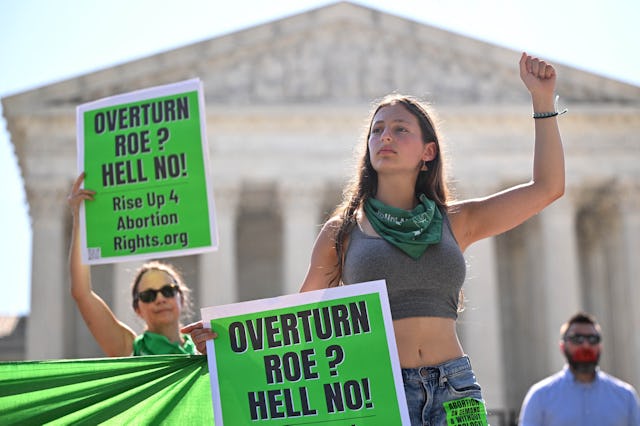States Are Preparing For The Repeal Of Roe v. Wade
States expected to keep abortion legal, like Minnesota and Illinois, are anticipating a massive influx of out-of-state abortions.

While the Supreme Court hasn’t officially announced whether or not it will overturn Roe v. Wade, the decision is likely imminent. SCOTUS tends to save its most controversial decisions for the middle of June or early July. The impending repeal of the seminal 1973 court case that made safe and legal access to abortion a constitutional right has states with archaic bans on abortions preparing for the worst.
For example, Wisconsin Planned Parenthood has announced that they will not schedule abortion services after June 25. The state requires people who want abortions to undergo two appointments with a 24-hour waiting period in between.
"We are anticipating that the ruling will likely come before the end of June, so we are not scheduling our typical day one/day two procedures after June 25th," Allie Linton, an obstetrician and gynecologist and associate medical director at Planned Parenthood of Wisconsin, told The Milwaukee Journal Sentinel.
Wisconsin Planned Parenthood is ready to continue the first consultation appointment, namely to help folks navigate their options should Wisconsin revert back to an 1849 law that only allows abortion if it is medically necessary to save the pregnant person’s life.
"Obviously if we are wrong and the ruling has not come out on the 27th, we will try to open up schedules and do the best that we can to get people in," Linton added. "Or if we're wrong and the ruling says something different, then we will open up schedules galore."
Wisconsin isn’t the only state at risk of losing safe access to abortions. Twenty-six states are likely to ban abortion, 13 of which already have abortion trigger laws in place. These laws are designed to be “triggered” and take immediate and automatic effect should Roe v. Wade be repealed.
This is putting a lot of pressure on the few states like Minnesota and Illinois that have abortion access protections in place.
"We are just surrounded by states that are going to ban abortion and it's going to really increase the burden here in Minnesota which is already...having access issues," Jess Braverman, legal director for Gender Justice, a nonprofit advocacy group that works on gender equity issues, told Fox 9.
"It's going to create chaos. There's one state where it may be like homicide to provide an abortion and another state where abortion is protected," Braverman continued.
“We are already an oasis in a vast abortion desert,” Jennifer Welch, president and chief executive officer of Planned Parenthood of Illinois, explained to The Wall Street Journal. “The anticipated decision…doesn’t change that, it just increases the size of the desert.” The organization expects an additional 20,000 to 30,000 patients a year should Roe be overturned.
Abortion providers in Colorado and Florida — two states that also border states with restrictive or outran bans on abortion in place — are also preparing for an influx of out-of-state patients. But Florida might not be a haven for much longer, as experts believe that Republican leaders will try to make stricter limitations on its current law that bans abortions after the 15-week mark.
“We’re very good at getting people from out of state. What’s new is the number of people, and that they need access to care much earlier in their pregnancy,” Karen Middleton, president of Denver-based Cobalt Abortion Fund told WSJ. The organization has already seen a 17% increase in out-of-state patients from last year, or before Texas banned abortion.
It’s gonna be a long few days (or weeks, depending on when the decision is announced) for us all. Deep breaths, y’all.